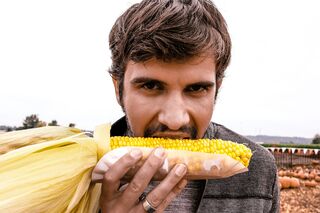Are Meat-Eating Men More Masculine?
Recent research shows that “new males” value meat differently
by Kevin Bennett Ph.D.
Homer Simpson, the lovably self-unaware cartoon dad icon, once danced out a rhythm to the pro-meat mantra, “You don’t win friends with salad.” Bart and Marge joined in, giving tacit approval to the “meat-power-prestige” theory, while vegetarian leaning daughter Maggie looked on, predictably dejected.
Real Men Eat Meat
At the heart of this is the age-old stereotype that “real men eat meat.” The comedy bit works because the connection between meat and masculinity, wholly embraced by Homer Simpson and countless others, stretches across time and cultures. Around the world, food—especially meat—stands out as the centerpiece for most special celebrations of community, harvest, holiday, family, religion, and power.
Given the traditionally patriarchal forces that gave rise to these rituals, it should not be surprising that the psychological link between cooked meat and machismo runs deep. There is certainly historical precedent for this cross-cultural stereotype, but is it true?
Is the Meat and Masculinity Link Too Stereotypical?
Research has consistently shown that there are sex differences in meat consumption as well as attitudes towards vegetarians. However, less attention has been given to the differences within men. New research explores the variation within men and underscores the idea that all males do not think the same way. Some men identify themselves with a new form of masculinity, one that values authenticity, domesticity and holistic self-awareness.
This study investigates if endorsement of these newer forms of masculinity can predict differences in meat consumption, willingness to reduce meat, and attitudes towards vegetarians among men. A total of N=309 male meat-eating participants were surveyed about their self-identification with new forms of masculinity, their attachment to meat, willingness to reduce their meat intake, and attitudes towards vegetarians.
Results show that men who identify more strongly with new forms of masculinity consume less meat, have a weaker attachment to meat, have a greater tendency to reduce their meat intake, and have more positive attitudes towards vegetarians.
In sum this study suggests we should not only take biological sex differences into account, but socially and culturally determined gender differences when studying or promoting the (non-)consumption of meat.
Vegetarianism: The New Masculinity?
When Jonah Hill and Channing Tatum return to high school as undercover narcotic agents in 21 Jump Street they are nonplussed to find that the teenage social hierarchies they were accustomed to have been upended. Studious, intelligent, environmentally conscious vegetarians are now the cool kids. Gone are the days of meat-eating muscle heads running the show and proudly displaying a total lack of general curiosity. Are we witnessed the same cultural shift in real life?
Although new forms of masculinity have been researched qualitatively and widely discussed, such nontraditional features of masculinity are rarely operationalized and measured. To assess the degree to which individuals adhere to ‘new’ norms of masculinity, the authors used the New Masculinity Inventory (NMI). High scores on this test suggest holistic attentiveness, questioning males norms, authenticity, domesticity and nurturing, and sensitivity to male privilege.
Still, the “meat is manly” ethos is alive and well, especially among men. The authors point out that men, relative to women, tend to have stronger pro-meat attitudes, greater denials of animal suffering, and firmer beliefs that eating meat is natural to human beings. More men than women can be found grilling meat at the barbecue and compared to female vegetarians and vegans, male vegetarians and vegans are evaluated more negatively.
Is vegetarianism the new masculinity? Right now this bold statement may be a bridge too far, but the tide is slowly turning. Chew on that.
©2020 Kevin Bennett PhD. All rights reserved.